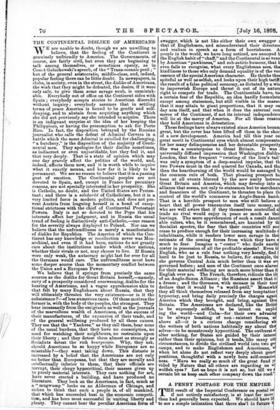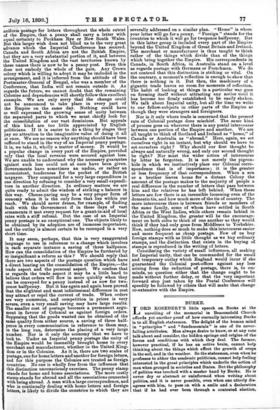A PENNY POSTAGE FOR THE EMPIRE. T HE result of the
Imperial Conference on postal rat if not entirely satisfactory, is at least far more than had generally been expected. We should have 1 to see a simple intimation that there sha'l in future
uniform postage for letters throughout the whole extent of the Empire, that a penny shall carry a letter with equal certainty to Peckham Rye or New South Wales. But this larger wish does not blind us to the very great advance which the Imperial Conference has secured. Canada and South Africa are not the British Empire, but they are a very substantial portion of it, and between the United Kingdom and the vast territories known by these names there is now to be a penny post. Even this does not embody the whole of the gain. Any Crown colony which is willing to adopt it may be included in the arrangement, and it is inferred from the attitude of the Postmaster-General of Bengal, who was a member of the Conference, that India will not remain outside it. As regards the future, we cannot doubt that the remaining Colonies and dependencies will shortly follow this excellent example. We are only sorry that the change could not be announced to take place in every part of the Empire on the same day. Nothing could have so well expressed the growing sense of unity between the separated parts to which we must chiefly look for the consolidation of our vast dominions. But appeals of this kind are too little appreciated by English politicians. If it is easier to do a thing by stages they pay no attention to the imaginative value of doing it all at once. We see no reason why anything should have been suffered to stand in the way of an Imperial penny postage. Et is, we take it, wholly a matter of money. It would be a popular change in every part of the Empire, provided only that the local revenue were secured against loss. We are unable to understand why the necessary guarantee against such loss could not at once have been given. Governments have sometimes an undue, or rather an inconsistent, tenderness for the pocket of the British taxpayer. They compound for a very large expenditure in one direction by refusing to consider a very small expendi- ture in another direction. In ordinary matters we are quite ready to admit the wisdom of striking a balance in this way. Cheese-paring may be a very proper form of economy when it is the only form that lies within our reach. We should never dream, for example, of finding fault with the Government if in these days of vast armaments it met every request for a grant-in-aid of local rates with a stiff refusal. But the case of an Imperial penny postage is an exceptional one. The objects likely to be obtained by its adoption are of immense importance, and the outlay is almost certain to be recouped in a very short time.
It may seem, perhaps, that this is very exaggerated language to use in reference to a change which involves in each separate instance a saving of three halfpence. How can the consolidation of the Empire be furthered by so insignificant a reform as this ? We should reply that there are two aspects of the postage question which have a direct bearing on the consolidation of the Empire,—the trade aspect and the personal aspect. We confess that as regards the trade aspect it may be a little hard to believe that orders will flow in more quickly when they pan be conveyed for a penny instead of as now for two- pence halfpenny. But it has again and again been proved that the slightest and most infinitesimal difference in cost may attract or repel the current of trade. When orders are very numerous, and competition in prices is very severe, even a very small saving may have large results. The smaller cost of postage becomes a permanent argu- ment in favour of Colonial as against foreign orders. Supposing that the goods wanted can be obtained of the same quality from either source, a saving of three half- pence in every communication in reference to them may, in the long run, determine the placing of a very large number. Nor is it only the economy that we have to look to. Under an Imperial penny postage the unity of the Empire would be insensibly brought home to every merchant and manufacturer, whether in the United King- dom or in the Colonies. As it is, there are two scales of postage, one for home letters and another for foreign letters, and for this purpose the Colonies are treated as foreign countries. No one is wholly free from the influence that this distinction unconsciously exercises. The penny stamp stands for home and home associations. The more costly stamp stands for abroad and all the associations connected with being abroad. A man with a large correspondence, and who is continually dealing with home letters and foreign letters, is likely to divide the countries to which they are severally addressed on a similar plan. "Home" is where your letter will go for a penny. " Foreign " stands for the countries to which it will go for twopence halfpenny. But in this latter group is included every part of the Empire beyond the United Kingdom of Great Britain and Ireland. The merchant or manufacturer is thus taught to think rather of the things which divide than of the things which bring together the Empire. His correspondents in Canada, in South Africa, in Australia stand on a level as regards postage with Germans or Frenchmen. We do not contend that this distinction is striking or vital. On the contrary, a moment's reflection is enough to show that there is nothing in it. But then, the machinery of a gigantic trade leaves no room for moments of reflection. The habit of looking at things in a particular way goes on forming itself without attracting any notice until it has become too firmly established to be easily shaken. We talk about Imperial unity, but all the time we write to our fellow-subjects in other parts of the Empire as though they were strangers and foreigners.
Nor is it only where trade is concerned that the present rate of Colonial postage does mischief. The same kind of process goes on wherever there is any postal intercourse between one portion of the Empire and another. We are all taught to think of Scotland and Ireland as " home," of Canada or Australia as " abroad." Here, again, we set ourselves right in an instant, but why should we have to set ourselves right ? Why should our first thought be always and naturally wrong, and only our second thought be right? Nor must the wider action of intercourse by letter be forgotten. It is not merely the pigeon- hole in which we instinctively place our Colonial corre- spondence that is of importance ; it is the greater or less frequency of that correspondence. When a son or a brother leaves home for a distant Colony the amount of the postage makes to the majority of people a real difference in the number of letters that pass between him and the relatives he has left behind. When these letters are few there is an insensible loosening even of the domestic tie, and how much more of the tie of country. The more intercourse there is between friends or members of the same family, some of whom have settled in South Africa or the West Indies, while others remain behind in the United Kingdom, the greater will be the encourage- ment on both sides to think of one another as they would think if they bad only gone from Middlesex to Yorkshire. Now, nothing does so much to make this intercourse easier and more frequent as cheap postage. Few of us buy foreign stamps with as little thought as we buy ordinary stamps, and the distinction that exists in the buying of stamps is reproduced in the writing cf letters.
Considering the variety of small influences, all making for Imperial unity, that can be commanded for the small and temporary outlay which England would incur if she guaranteed the Colonial post-offices against any loss arising from the reduction of postage, there is, to our minds, no question either that the change ought to be made without further delay, or that the very important forward step just taken by the Postal Conference will speedily be followed by others that will make that change co-extensive with the Empire.



































 Previous page
Previous page